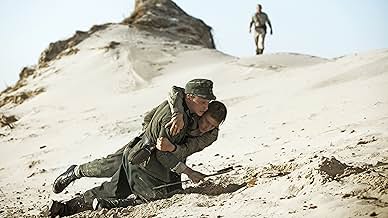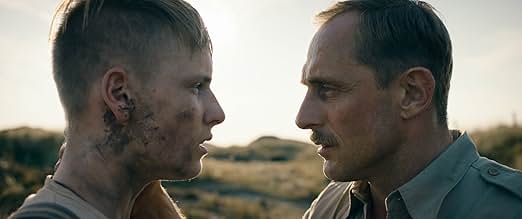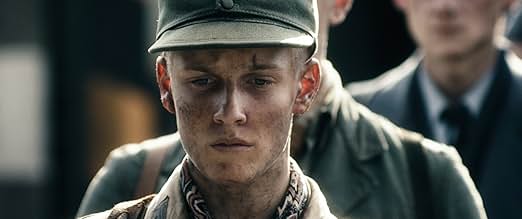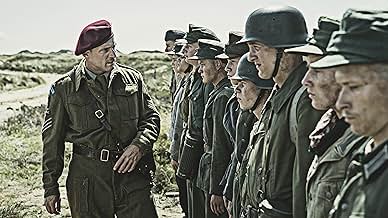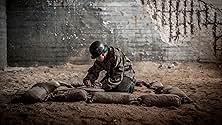VALUTAZIONE IMDb
7,8/10
48.231
LA TUA VALUTAZIONE
Nella Danimarca del secondo dopoguerra, un gruppo di giovani prigionieri di guerra tedeschi sono costretti a ripulire una spiaggia di migliaia di mine antiuomo.Nella Danimarca del secondo dopoguerra, un gruppo di giovani prigionieri di guerra tedeschi sono costretti a ripulire una spiaggia di migliaia di mine antiuomo.Nella Danimarca del secondo dopoguerra, un gruppo di giovani prigionieri di guerra tedeschi sono costretti a ripulire una spiaggia di migliaia di mine antiuomo.
- Candidato a 1 Oscar
- 33 vittorie e 27 candidature totali
Zoe Zandvliet
- Elisabeth, Karins Daughter
- (as Zoé Zandvliet)
Max Beck
- August Kluger
- (as Maximilian Beck)
Recensioni in evidenza
10Duchino
My dear friend Ilario, a cultured movie buff, had warmly suggested this film these past days, among the many he mentions and those we get to talk about, and I could perceive that he had figured how this "Land of Mine" would strike many chords with me. And it did; I watched it in original German/Danish with English subs (shaky at times, but OK), and the immersion was immediate from the impactful start. I'm sensitive to war scenarios and characters – especially lesser told ones – as this story tactfully paints a very sad, cruel and almost hopeless reality. The Sergeant is a great figure, the kids are true to life, the skies and beaches cold and lonely too. And full of death. "Under Sandet", instead, is full of cinematographic art.
In matters of war, no nation is free of guilt. Regardless of whether they are produced by victorious or vanquished countries, the better war films set out facts, acknowledge wrongdoing, express regret, and seek atonement. Many of them put guilt and culpability onto the widescreen so that current and future generations may learn from the past. This is the psychological space in which we find the extraordinary Danish-German war film Land of Mine (2016).
It is 1945 and the war is over, but the beautiful Danish coastline has two million deadly mines left buried in the sand by the Nazi occupation. Danish Sergeant Carl Rasmussen (Roland Møller) is assigned a squad of fourteen German prisoners of war who must clear a beach that contains 45,000 active mines. The Sergeant's treatment of the teenage boys is initially brutal: they live and work in terrible conditions, are practically starved and constantly reminded that everyone in Denmark hates them and nobody cares if they live or die. Their task is to crawl along the beach by hand, poking a stick in the sand to locate mines, then defuse them before they explode. Inevitably, many failed. With echoes of Stockholm syndrome, both captor and captives find glimpses of humanity in each other that leads to Rasmussen being suspected by his tormenting superiors of going soft on the Germans. He must walk the fine line between military obedience, personal hatred of Nazis, and his growing compassion and realisation that these are just boys who were conscripted into battle. His characterisation and its transition from hatred to acceptance frames the narrative of this high-tension drama.
Stunningly realistic cinematography with minute attention to detail amplifies the horror of this story. The acting is remarkable from a mostly unknown cast and Rasmussen's performance captures the very essence of moral conflict. The mine-clearing proceeds inch-by-agonising-inch, and the film's plot line inches forward at a similar pace. With camera at sand-level, we see close-up images of teenage warriors with beads of terror trickling down their faces as their sand-covered fingers slowly un-screw a detonator from a mine, knowing that an explosion will tear their body to pieces. These are some of the most heart-pulse racing moments you can experience through film. This is not entertainment nor is it for faint-hearted viewers; several scenes are horrific.
Most war films glorify battle or corner us into cheering one side or the other. This film presents an exquisite conundrum: was it morally acceptable for the Danish military to force German POWs to remove the deadly mines that the Nazi army left behind, knowing that most will die or be maimed? Or should this deadly work have been carried out by Danish soldiers? Was the inhumane treatment of teenage soldiers justifiable, regardless of the brutality of the Nazi occupation of Denmark? In the light of such questions, is this film one of justification or a confessional that seeks atonement? Land of Mine shines a bright light on what has hitherto been a dark secret of Danish history. It is a powerful and important story.
It is 1945 and the war is over, but the beautiful Danish coastline has two million deadly mines left buried in the sand by the Nazi occupation. Danish Sergeant Carl Rasmussen (Roland Møller) is assigned a squad of fourteen German prisoners of war who must clear a beach that contains 45,000 active mines. The Sergeant's treatment of the teenage boys is initially brutal: they live and work in terrible conditions, are practically starved and constantly reminded that everyone in Denmark hates them and nobody cares if they live or die. Their task is to crawl along the beach by hand, poking a stick in the sand to locate mines, then defuse them before they explode. Inevitably, many failed. With echoes of Stockholm syndrome, both captor and captives find glimpses of humanity in each other that leads to Rasmussen being suspected by his tormenting superiors of going soft on the Germans. He must walk the fine line between military obedience, personal hatred of Nazis, and his growing compassion and realisation that these are just boys who were conscripted into battle. His characterisation and its transition from hatred to acceptance frames the narrative of this high-tension drama.
Stunningly realistic cinematography with minute attention to detail amplifies the horror of this story. The acting is remarkable from a mostly unknown cast and Rasmussen's performance captures the very essence of moral conflict. The mine-clearing proceeds inch-by-agonising-inch, and the film's plot line inches forward at a similar pace. With camera at sand-level, we see close-up images of teenage warriors with beads of terror trickling down their faces as their sand-covered fingers slowly un-screw a detonator from a mine, knowing that an explosion will tear their body to pieces. These are some of the most heart-pulse racing moments you can experience through film. This is not entertainment nor is it for faint-hearted viewers; several scenes are horrific.
Most war films glorify battle or corner us into cheering one side or the other. This film presents an exquisite conundrum: was it morally acceptable for the Danish military to force German POWs to remove the deadly mines that the Nazi army left behind, knowing that most will die or be maimed? Or should this deadly work have been carried out by Danish soldiers? Was the inhumane treatment of teenage soldiers justifiable, regardless of the brutality of the Nazi occupation of Denmark? In the light of such questions, is this film one of justification or a confessional that seeks atonement? Land of Mine shines a bright light on what has hitherto been a dark secret of Danish history. It is a powerful and important story.
Nominated for Best Foreign Language Film at the upcoming Academy Awards, Land of Mine (also known as Under sandet) is a disturbing, disquieting & devastating cinema that's inspired from the immoral & inhuman act that the Danish authorities perpetrated against German POWs, majority of whom were teenagers, following the end of the Second World War in Europe.
Set in post-World War II Denmark, the story of Land of Mine follows a Danish Sergeant who is assigned the duty to defuse & remove over 2 million mines that were buried by the Germans along the coast during the war. Receiving a batch of teenage Germans POWs to carry out the operation, the Sergeant's initial hostility towards them begins to undergo an unexpected change.
Written & directed by Martin Zandvliet, the film opens with a crucial sequence that establishes the seething hatred that the Sergeant has against Germans and takes it up from there. Every segment featuring the young boys trying to defuse the mines with their bare hands despite being obviously ill-equipped to carry out the dangerous task is nail-biting as hell and even more hard-hitting when they fail at it.
Zandvliet's direction exhibits terrific restraint from start to finish and even more admirable is how he handles the characters & their arcs. Without choosing a side, he puts believable people on screen and keeps all their human attributes in tact, whether they are Danish or Germans. And while the hostile nature of the former against the latter is understandable, what the Danish authorities force them to do is equally inexcusable.
Shot at historically authentic locations, the entire picture is splendidly photographed and the era of Denmark recovering from the war is wonderfully captured by its desaturated & earthy colour tones. Camera-work is hand-held, static & expertly controlled for the most part and allows the scenes to play out at their desired pace but the longer it lingers on the defusing process, the more suspenseful it becomes and majority of the time, ends on a heartbreaking note.
Editing is skilfully carried out, for every single minute of its 1½ hour narrative is accounted for & is relevant to the plot. Every sequence on the beach is compelling & handled with patience and every explosion or casualty reverberates with the audience & the impact of it is deeply felt. The film does feel longer than its runtime but it is relentlessly gripping till the end. And further enhancing its grim aura is the poignant score that always surfaces on time.
Coming to the performances, Land of Mine features an incredibly committed cast in Roland Møller, Louis Hofmann & others, with Hofmann impressing the most. Møller is in as the Sergeant overseeing the mine clearing operation and expresses his character's inner conflict brilliantly while Hofmann plays one of the young boys performing the fatal, endless task of defusing millions of buried mines with stunning balance, and the scenes between the two are its main highlight.
On an overall scale, Land of Mine not only ranks amongst the best films of its year but is one of the finest films to come out from Cinema of Denmark. Incessantly human, powerfully moving & making a strong statement about what makes us human & why it's even more important to stay as one in times of bitter conflict, this Danish masterpiece is an extremely riveting example of its genre that treads a difficult path & is utterly discomforting at times yet manages to fully redeem itself in the end. An essential viewing by all means, this Danish masterpiece comes very highly recommended.
Set in post-World War II Denmark, the story of Land of Mine follows a Danish Sergeant who is assigned the duty to defuse & remove over 2 million mines that were buried by the Germans along the coast during the war. Receiving a batch of teenage Germans POWs to carry out the operation, the Sergeant's initial hostility towards them begins to undergo an unexpected change.
Written & directed by Martin Zandvliet, the film opens with a crucial sequence that establishes the seething hatred that the Sergeant has against Germans and takes it up from there. Every segment featuring the young boys trying to defuse the mines with their bare hands despite being obviously ill-equipped to carry out the dangerous task is nail-biting as hell and even more hard-hitting when they fail at it.
Zandvliet's direction exhibits terrific restraint from start to finish and even more admirable is how he handles the characters & their arcs. Without choosing a side, he puts believable people on screen and keeps all their human attributes in tact, whether they are Danish or Germans. And while the hostile nature of the former against the latter is understandable, what the Danish authorities force them to do is equally inexcusable.
Shot at historically authentic locations, the entire picture is splendidly photographed and the era of Denmark recovering from the war is wonderfully captured by its desaturated & earthy colour tones. Camera-work is hand-held, static & expertly controlled for the most part and allows the scenes to play out at their desired pace but the longer it lingers on the defusing process, the more suspenseful it becomes and majority of the time, ends on a heartbreaking note.
Editing is skilfully carried out, for every single minute of its 1½ hour narrative is accounted for & is relevant to the plot. Every sequence on the beach is compelling & handled with patience and every explosion or casualty reverberates with the audience & the impact of it is deeply felt. The film does feel longer than its runtime but it is relentlessly gripping till the end. And further enhancing its grim aura is the poignant score that always surfaces on time.
Coming to the performances, Land of Mine features an incredibly committed cast in Roland Møller, Louis Hofmann & others, with Hofmann impressing the most. Møller is in as the Sergeant overseeing the mine clearing operation and expresses his character's inner conflict brilliantly while Hofmann plays one of the young boys performing the fatal, endless task of defusing millions of buried mines with stunning balance, and the scenes between the two are its main highlight.
On an overall scale, Land of Mine not only ranks amongst the best films of its year but is one of the finest films to come out from Cinema of Denmark. Incessantly human, powerfully moving & making a strong statement about what makes us human & why it's even more important to stay as one in times of bitter conflict, this Danish masterpiece is an extremely riveting example of its genre that treads a difficult path & is utterly discomforting at times yet manages to fully redeem itself in the end. An essential viewing by all means, this Danish masterpiece comes very highly recommended.
Several World War II stories are not told in the books, being forgotten over time. Inspired by true events, the film Under Sandet (original title) or Land of Mine (in English) addresses one of these reports, which occurred in Denmark after the war. Fearing that a possible Allied invasion would take place from the Danish coast, Nazi Germany filled the entire length of Denmark's west coast with over 1.5 million mines. With the German surrender and the end of the war in May 1945, more than 2,000 German prisoners of war were sent to disarm those landmines. The story focuses on a small group of young Germans who have the hard and dangerous task of clearing 45,000 mines from a danish beach to gain freedom.
The film, written and directed by Martin Zandvliet, is an excellent motion picture, managing to bring to the screen a work with a new approach, although all the other war films ever made before. With an original script, the director succeeds to convey the bitterness brought by five years of Nazi occupation in Denmark. He also portrays the exploitation of children dragged into war. One of the great successes of Zandvliet's direction and script is to show the war cycles: the winners, the danes, start to adopt the brutal practices of the losers, the Germans. It was precisely for situations like this that the Second World War broke out. France and other winning countries of World War required repairs and imposed absurd sanctions to Germany.
The photography, by Camilla Hjelm, is to behold. And here, again, we have to highlight the director's work. The use of long shot captures the beautiful danish landscape, while more intimate moments allow us to monitor the interactions among those soldiers. Maintaining an intense pace, the tranquility and vastness of the beach are contrasted, at all times, with the danger that awaits them "under the sand", expression that names the film. The soundtrack is catchy and at times heartbreaking, fitting in the drama narrated in the film.
One of the elements that makes Land of Mine a memorable experience is the excellent performance of Roland Møller, playing the role of Sergeant Carl Rasmussen, protagonist of the story. Responsible to oversee the group of German soldiers, Carl struggle to separate his military duties from the hatred he feels for the old enemy. The actor delivered a complex character, moody, bitter and angry, but at the same time which has not lost humanity that exists within him. The rest of the cast was also well chosen and psychologically developed, in which the actors who play the soldiers have different personalities.
With a philosophical discussion about military conflicts as well as being very intense and beautiful, Under Sandet gives us a real view of the complexities of the Second World War and human behavior.
Originally posted in: https://vikingbyheart.blogspot.com.br
The film, written and directed by Martin Zandvliet, is an excellent motion picture, managing to bring to the screen a work with a new approach, although all the other war films ever made before. With an original script, the director succeeds to convey the bitterness brought by five years of Nazi occupation in Denmark. He also portrays the exploitation of children dragged into war. One of the great successes of Zandvliet's direction and script is to show the war cycles: the winners, the danes, start to adopt the brutal practices of the losers, the Germans. It was precisely for situations like this that the Second World War broke out. France and other winning countries of World War required repairs and imposed absurd sanctions to Germany.
The photography, by Camilla Hjelm, is to behold. And here, again, we have to highlight the director's work. The use of long shot captures the beautiful danish landscape, while more intimate moments allow us to monitor the interactions among those soldiers. Maintaining an intense pace, the tranquility and vastness of the beach are contrasted, at all times, with the danger that awaits them "under the sand", expression that names the film. The soundtrack is catchy and at times heartbreaking, fitting in the drama narrated in the film.
One of the elements that makes Land of Mine a memorable experience is the excellent performance of Roland Møller, playing the role of Sergeant Carl Rasmussen, protagonist of the story. Responsible to oversee the group of German soldiers, Carl struggle to separate his military duties from the hatred he feels for the old enemy. The actor delivered a complex character, moody, bitter and angry, but at the same time which has not lost humanity that exists within him. The rest of the cast was also well chosen and psychologically developed, in which the actors who play the soldiers have different personalities.
With a philosophical discussion about military conflicts as well as being very intense and beautiful, Under Sandet gives us a real view of the complexities of the Second World War and human behavior.
Originally posted in: https://vikingbyheart.blogspot.com.br
There's a weird double edge sword going on here. Though I can't blame the Danish for being so cruel to the Germans so soon after the war ended, it's difficult in this PC world of 2017 to see this happening.
Denmark forces German soldiers to clean up their mess (A series of beaches infected with their land mines) before they can go home. Making this task even crueler is the soldiers doing it don't look old enough to smoke a cigarette.
It was a very honest look at the aftermath of war. The Danish military were treating the German's worse than dogs, though Germany deserved it for the part they played in WWII. Land of Mine is a focus on humanity as one Danish Commanding officer must find this with a group of German boys he commands like they were slaves
Land of Mine was at times hard to look at, especially when these kids were getting blown up. A little too real on how land mines work. One minute you're there, the next minute you're gone. Sometimes you saw the explosion coming, and then they surprise you with one you didn't. It strangely added to the drama.
Land of Mine was an interesting look on what it takes to turn the other cheek and forgive the enemy.
http://cinemagardens.com
Denmark forces German soldiers to clean up their mess (A series of beaches infected with their land mines) before they can go home. Making this task even crueler is the soldiers doing it don't look old enough to smoke a cigarette.
It was a very honest look at the aftermath of war. The Danish military were treating the German's worse than dogs, though Germany deserved it for the part they played in WWII. Land of Mine is a focus on humanity as one Danish Commanding officer must find this with a group of German boys he commands like they were slaves
Land of Mine was at times hard to look at, especially when these kids were getting blown up. A little too real on how land mines work. One minute you're there, the next minute you're gone. Sometimes you saw the explosion coming, and then they surprise you with one you didn't. It strangely added to the drama.
Land of Mine was an interesting look on what it takes to turn the other cheek and forgive the enemy.
http://cinemagardens.com
Lo sapevi?
- QuizThe actors were trained in mine clearance 'anno 1945' at the Military Training Compound 'Oksbøl.' During training, they found a 'live' mine that had been there for 70+ years--and it was in fine working condition. The mine was removed and disarmed by the Danish de-mining experts.
- BlooperThey are mainly clearing Anti-Tank mines, and indeed mention this in the dialogue. However, Anti-Tank mines are designed to not be triggered by a person's weight, so troops can cross them without them going off--so that they are still in place and active when armored vehicles in support of the troops ultimately cross the same path as the troops. Anti-Tank mines need several tons of pressure to activate. In the film, they are treated like eggshells.
- Citazioni
Lt. Ebbe Jensen: If they are old enough to go to war, they are old enough to clean up.
- ConnessioniFeatured in La noche de...: La noche de... Bajo la arena (2021)
I più visti
Accedi per valutare e creare un elenco di titoli salvati per ottenere consigli personalizzati
- How long is Land of Mine?Powered by Alexa
Dettagli
- Data di uscita
- Paesi di origine
- Siti ufficiali
- Lingue
- Celebre anche come
- Land of Mine
- Luoghi delle riprese
- Aziende produttrici
- Vedi altri crediti dell’azienda su IMDbPro
Botteghino
- Budget
- 35.500.000 DKK (previsto)
- Lordo Stati Uniti e Canada
- 435.266 USD
- Lordo in tutto il mondo
- 3.169.553 USD
Contribuisci a questa pagina
Suggerisci una modifica o aggiungi i contenuti mancanti







